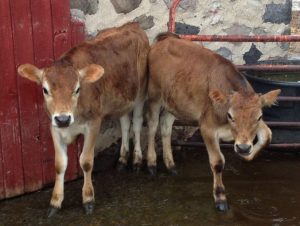 It’s a question asked by many for good reasons considering the rapid growth of vegans and many others who show a great interest in plant-based food.
It’s a question asked by many for good reasons considering the rapid growth of vegans and many others who show a great interest in plant-based food.
We believe it’s due to our capacity to evolve as moral beings, our thirst to seek the truth, and our ability to question our own thoughts and deeds.
But before knowing the various noble & personal reasons for this infectious shift, you may first need to clarify as to what embodies a real vegan.
A vegan is a person who does not consume animal products (including by-products) and doesn’t contribute or participate in any kind of animal cruelty or exploitation. This definition is based on the doctrine of the word veganism which was founded by the Vegan Society in 1951 [1].
Some of you may think, “why go vegan or bother? How am I to forgo the joy of eating a steak, drinking a milkshake or the comforts & style of a leather jacket?”
However, wouldn’t it be such a relief if we told you that you don’t have to lose your cravings & comforts, to go vegan. This post starts showing exactly that, besides revealing many other reasons which have far-reaching implications.
Let’s discuss the six convincing reasons, why increasingly many are opting for a vegan lifestyle.
1. It’s Not Really a Sacrifice Anymore!
As we told before, gone are the days where it was quite a challenge to pursue a vegan lifestyle without sacrificing your taste & comforts to an extent.
With the ever-evolving vegan trend & demand, and thanks to so many vegan-friendly product manufacturers, things have become much easier today. Because many suppliers have realized that there is a growing demand for vegan products and with the demand increasing year over year they have found a profitable market to which they can cater.
Today there is no reason for you to stop loving the taste of meat, eggs, milk or even cheese just because you’ve become vegan.
See a list of substitutes and vegan food options to indulge yourself:
- Meat can be substituted with mushrooms, jackfruit, eggplant, tempeh (Non-GMO), tofu (Non-GMO), and other meat analogs.
- Dairy milk can be replaced with soy milk (Non-GMO), almond milk, cashew milk, hemp milk, rice milk, and coconut milk.
- Eggs can be substituted with tofu / silken tofu (Non-GMO), agar powder and brands like VeganEgg, etc. Irrespective of whether you want to have a dish with eggs or use it for baking there is a vegan option.
- Cheese substitutes are soy cheese, nut cheese, seed cheese, and rice cheese.
- Most quality dark chocolates are vegan and there are many vegan chocolate brands.
- You have access to many vegan fortified food options for nutrition and add variety.
- In fact, by now, there is hardly a food item sourced from animals that doesn’t have a vegan option. There are vegan ice cream brands, vegan cookies, and many more vegan options to keep you satisfied!
As you can see, when it comes to replacing non-vegan food, your options are practically limitless, and there seems to be no reason what so ever to miss any of it.
Much like food, it is the same for style & fashion. Leather, fur can be subbed by faux/synthetic leather & fur. Instead of sheep’s wool, you can use cotton wool. For silk, you can choose nylon and rayon. There is hardly any animal product that doesn’t have an alternative today. So it boils down to a matter of awareness.
2. For Animals
Preventing animal cruelty, exploitation and to standby animal rights are the reasons why many decide to go vegan. It was the same motive that prompted myself to go vegetarian initially and then be vegan later (I became vegan after learning about the dairy industry).
Just take a look at the meat and dairy farm images below and sincerely ask whether you want to support these industries.





Animals are not objects, and they have feelings, have beautiful & varied personalities, social bonds, hierarchies and they experience life besides not forgetting how intelligent they’re. On the other hand, just like us, they have every reason to fear pain & death.
By going vegan, you do your part in reducing demand for animals to be slaughtered for profits and satisfy taste buds. In totality, if you be vegan that may help save 100-200 animals per year approximately (including sea animals). Going vegan helps you sincerely appreciate animals at a much higher capacity without any guilt knowing that you have done your part to save and protect them.
3. Why Vegan Diet? For Health

Many would want to know other reasons behind choosing a vegan diet, with an intention of knowing all the health benefits that come with typical vegan diets.
A lot of vegans can attest to this as there are numerous scientifically proven health benefits linked to healthy vegan diets compared to standard western diets.
Below are some of the top health benefits you can expect when you go vegan:
- Reduced risk of heart attacks & strokes (leading causes of death) [2]
- Prevent obesity, reduce and control weight [2]
- Lower risk of diabetes, high blood pressure, and some types of cancer [2]
- Prevent many diseases spread from animals and other harmful effects of animal hormones & antibiotics [3].
- Other benefits include but are not limited to healthy skin, longevity, better digestion, better sleep [4], etc.
While a vegan diet can easily get fiber, protein, carotenoid, vitamin C, vitamin E, magnesium, folic acid, iron and phytochemicals, a well-planned vegan diet & lifestyle can take care of calcium, vitamin B12, omega-3 fatty acids, vitamin D, and zinc as well.
The vegan diet also has proven to be ideal for all stages of life starting from pregnancy, infancy, childhood up to adolescence [5]. Since a healthy vegan lifestyle demands an awareness of balancing nutrition and eating more vegetables, fruits, nuts, and seeds, there is a tendency to be health-oriented when you become vegan.
In fact, a vegan diet can be successfully adopted by athletes and bodybuilders as well. You can find many real-world examples of athletes and bodybuilders who are following these diets.
4. For Humanity and Environment
Many children and adults in the world die due to malnutrition and starvation. Going vegan is one of the best things you can do for humanity and even for the environment as well.
If the entire world goes vegan, there will be enough food to feed everybody including all the malnourished people in the world.
Apart from the mistreatment of animals many of the animal factory farms are known for violation of labor laws, low labor standards, and higher labor turnover. Many of these workers have low to no education and are not even aware of their rights.
They are being put under tremendous physiological and mental stress and exposed to a high level of injury, where their human rights can seriously be questioned. No big surprise, it has been named as one of the riskiest jobs in USA.
Thus, if you go vegan, you’re doing your part to discourage this exploitative industry. At the end of the day, one needs to ask “am I going to support an industry that kills for a living?”
As far as the environment is concerned, let’s look at some stats:
- According to one study, farm animals seem to create more greenhouse gasses than the transportation sector [6]. These greenhouse gasses consist of intestinal gas, decomposition of animal droppings, and carbon dioxide released via deforestation to create grazing lands for livestock and animal feed crop.
- In 11 western states of the USA, approximately 70% is grazed by livestock [7].
- Grazing has caused an issue for 171 endangered species.
- About 80% of the deforested Amazon rainforest is made as grazing land for livestock [8].
- Land used as pasture & crops to feed farm animals causes the highest deforestation while making it quite difficult to restore for other types of farming for human consumption.
- To produce one pound of beef it takes approximately 1,800 gallons of water [9] compared to 700 gallons to make a pound of lentils and 299 gallons to make a pound of rice [10].
No doubt, by adopting a vegan lifestyle, you choose a much greener path and would lessen your impact on the environment.
5. For Better Conscience & Positive Outlook
People with a moral compass would always value a finer conscience and consider it to be a no trade-off.
Irrespective of the motive to become vegan, consciously or subconsciously vegans know that they are making a contribution towards noble causes.
Not only these lifestyles would lead to a brighter future for our own species, but it is an attempt towards a world with greater coexistence for all sentient beings and natural habitat.
Further, anyone becoming a vegan would know that it takes compassion, critical thinking, commitment, and self-belief to make such transitions. All these powerful qualities, forces and fulfillment enable vegans to have a positive outlook on life and future in general.
6. The Probable Financial Savings
Transitioning from an omnivore’s diet to a vegan diet could be budget friendly as well. True that, when someone asks why be vegan, this is certainly not the main reason you would get as an answer. But you can always consider this as a bonus from the animals and nature for going vegan.
The cost per gram of beef, milk & eggs is much higher compared to a gram of vegan options like oats, beans, lentils & chickpeas. This shows you don’t have to be rich to go vegan. All it takes is an inexpensive, well-planned diet to be a healthy vegan.
Did we mention the hospital bills you may save if you go vegan? Considering the number of health benefits a vegan lifestyle provides it is a saving a vegan should expect. Apart from that, there are broader & indirect environmental, social, and economic cost savings from reduced environmental damage and a healthy population.

Final Thoughts
You have now learned many convincing reasons to go vegan and we presume you have understood all the parties affected by your decision and the gravity of it. Do note that it’s never too late (if that thought ever occurred to you) to be vegan.
By doing so, not only you will refrain from animal cruelty and exploitation, you will also embrace many health benefits and reduce the environmental impact on the planet which can badly affect the future generation.
If there are plenty of vegan foods available without compromising taste & health, if animals have a right to live, if we can lessen or even reverse environmental damage and have a better conscience as moral beings, instead of asking, why go vegan, it’s about time we ask, why not?
If you need to know more about veganism, you can find many other aspects related to veganism by navigating our website menu.
Disclaimer:
While every attempt has been made to verify the information provided here, the content in this post is for informational purposes only and not to be considered as professional advice. By providing the information contained herein we’re not diagnosing, or treating any type of disease or medical condition. Before beginning any regimen it is advisable to seek the advice of a licensed professional.
Related Posts:
- 5 Best Vegan Documentaries
- How to Continue as a Vegan
- Vegan Meat
- Vegan Milk
- Vegan Cheese
- Vegan Chocolate
- Vegan Ice Cream
- Eeating out as a Vegan
- Vegan Restaurants
References
[1] https://ivu.org/history/world-forum/1951vegan.html
[2] http://www.heart.org/HEARTORG/HealthyLiving/HealthyEating/Vegetarian-Diets_UCM_306032_Article.jsp#.WabC-fkjHIU
[3] https://www.ncbi.nlm.nih.gov/pmc/articles/PMC3234384/
[4] https://www.ncbi.nlm.nih.gov/pubmed/10943644
[5] https://www.ncbi.nlm.nih.gov/pubmed/19562864
[6] http://www.un.org/apps/news/story.asp?newsID=20772#.WabsEfkjHIV
[7]http://archives.evergreen.edu/alumni_writers/Fleischner/FleischnerLivestock.html
[8]http://globalforestatlas.yale.edu/amazon/land-use/cattle-ranching
[9]http://waterfootprint.org/media/downloads/Report-48-WaterFootprint-AnimalProducts-Vol1.pdf
[10]http://waterfootprint.org/media/downloads/Report47-WaterFootprintCrops-Vol1.pdf





